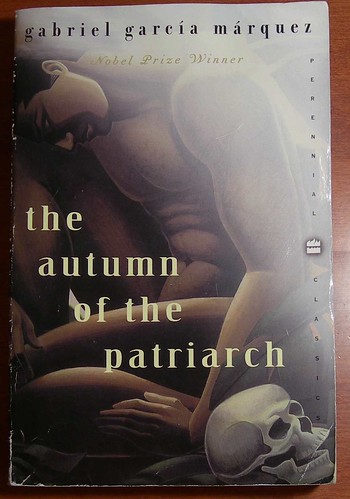by Gabriel Garcia Marquez, 1975
255pp
In theory, this should have been a very difficult book to put down. It provides almost no stopping points. This book is a thick stew of run-on sentences, eschewing paragraph and sentence breaks almost entirely. In its 255 pages, the book probably has around twenty periods. This has the effect of making it seem like a much longer book than it otherwise appear.
I first picked up this book back in November. Then the new Pynchon book came out, for which I would've dropped my own mother. After finishing Pynchon, I wasn't particularly interested in getting back to this book. After a few more reads, I picked this back up in early February. I don't think it was a week before I had selected another book to distract me from this one. By the time I had finished this book, I'd also read Hunger, The King, About Alice, and "Alcestis" & "Heracleidae" on the side.
Despite my distractions, I loved this book. Garcia Marquez tells the story of a tropical dictator's life through a series of flashbacks, and a stream of consciousness that runs from consciousness to consciousness. The book is at times narrated by the General himself, sometimes by someone speaking to him, sometimes by someone speaking about him. The narration of one event creates tangents, along which the narration runs to the details of some other event--never pausing to begin a new sentence--all the while shifting among its narrators. Reading this feels like you've dropped something slippery, which you catch, only to lose your grip on and catch in a different place, where it slips away again...
There is a rhythm by which the book regularly wraps up the anecdote at hand and returns to some regularly recurring image. Every twenty pages or so we hear the General described in more or less the same terms: his elephant-like feet, his denim uniform, his hands like claws, his herniated testicle. Likewise the General's various routines are repeated periodically, like the rosary.
Amongst the established order of recurring elements, we read the story of the General's impossibly long reign, though not always narrated chronologically. He betrays a friend, he introduces an enemy among his inner circle, he pursues a beauty queen, she eludes him, his mother died, the church will not make her a saint, the church is expelled, he falls for a former nun, she marries him and gives birth to an heir, they are killed, he creates a new branch of government to hunt & torture the conspirators who killed them, he exacts revenge on the man he installed in this ministry of vengeance. He's in power for over a hundred years, during which time he is alternately portrayed as being of limitless power & cunning, a man who commands every aspect of his realm, and powerless figurehead, whose government beneath him constantly seeks to placate him and convince him he still holds real power.

I often read in my tub, during which I can never keep my hands totally dry, and consequently the edges of pages of my books lose their crispness. This book, however, was sitting on the floor when streams of water from some misdirected jacuzzi jets shot out of the tub and soaked it through. Thus it is wavy, and waterlogged, and full of character.

No comments:
Post a Comment